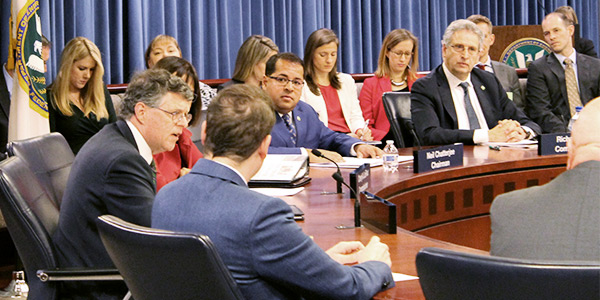FERC Commissioner Bernard McNamee bid farewell to the commission last week after a 21-month term during which the panel’s bipartisan traditions were tested as perhaps never before.
McNamee, a Republican whose term as replacement for former Commissioner Robert Powelson expired on June 30, announced in January that he would not seek a second term but agreed to remain on the commission pending his replacement. His last day was Friday.
President Trump announced McNamee’s replacement, Virginia State Corporation Commission Chair Mark Christie, in July. McNamee’s departure reduces the panel to three members pending the confirmation of Christie, a Republican, and clean energy activist Allison Clements, a Democrat. Clements would fill the seat left vacant by Cheryl LaFleur, who departed in August 2019. (See Trump to Nominate Christie, Clements to FERC.)
McNamee, a former aide to Sen. Ted Cruz (R-Texas), was serving as executive director of the Energy Department’s Office of Policy when he was tapped by Trump.
He was barely confirmed, 50-49, on a party-line vote. Democrats’ opposition to McNamee stemmed in part from his role in drafting DOE’s Notice of Proposed Rulemaking seeking subsidies for endangered coal and nuclear generators.
He also worked briefly as the director of the Texas Public Policy Foundation’s Center for Tenth Amendment Action, a group that files legal challenges over what it views as federal government overreach. It was in this role that McNamee promoted the center’s Life: Powered initiative — described as a project to “reframe the national discussion” about fossil fuels.
McNamee described the effort as “the key not only to our prosperity [and] quality of life, but also to a clean environment” and attacked environmental groups, describing their activism against fossil fuels as a “constant battle between liberty and tyranny.”
McNamee did not use such polarizing language after joining the commission. But he joined his fellow Republicans — Chairman Neil Chatterjee and since March, James Danly — in repeatedly vexing Commissioner Richard Glick, the lone Democrat since LaFleur’s departure.
While LaFleur had joined with the Republican commissioners in approving multiple natural gas pipelines and LNG export facilities, Glick has opposed them, contending the commission is violating the law by not considering the impacts of greenhouse gas emissions from the projects. Glick and the Republicans also clashed over commission orders that frustrated state emission-reduction policies. (See related story, FERC Rejects NYISO Bid to Aid Public Policy Resources.)
McNamee reflected on his term on the commission in a FERC Open Access podcast recorded shortly before his departure.
He said he was surprised by the volume of orders the commission issued — 941 in 2019 and more than 700 through August 2020. “For every party that comes before the commission, their issue is the most important. And I try to approach each case that comes before us with that in mind.”
He said he was particularly proud of the commission’s updates of its rules on return on equity and the Public Utility Regulatory Policies Act and its approval of 14 LNG export facilities.
“Before I got to the commission, for two years, no LNG export facility had been approved. After I got here, I dug into the law and the facts and was able to work with Commissioner LaFleur and the chairman, and we came up with a compromise,” he said. “And I think that’s something [that] is very good for the American people. With the abundance of natural gas that we have, being able to build those facilities ultimately will result in billions of dollars of investment [and] thousands of new jobs, and it will also give new policy tools to American elected officials in dealing with other countries because of the ability to use American energy in order to help influence events and support our allies and friends.”
The commissioner, who has been commuting weekly to D.C. from his home near Richmond, Va., had said he was eager to spend more time with his wife and teenage son. McNamee said he plans to take some time off before looking for his next job. “I expect that I’ll continue to work on energy issues from both legal and policy perspectives,” he said.






